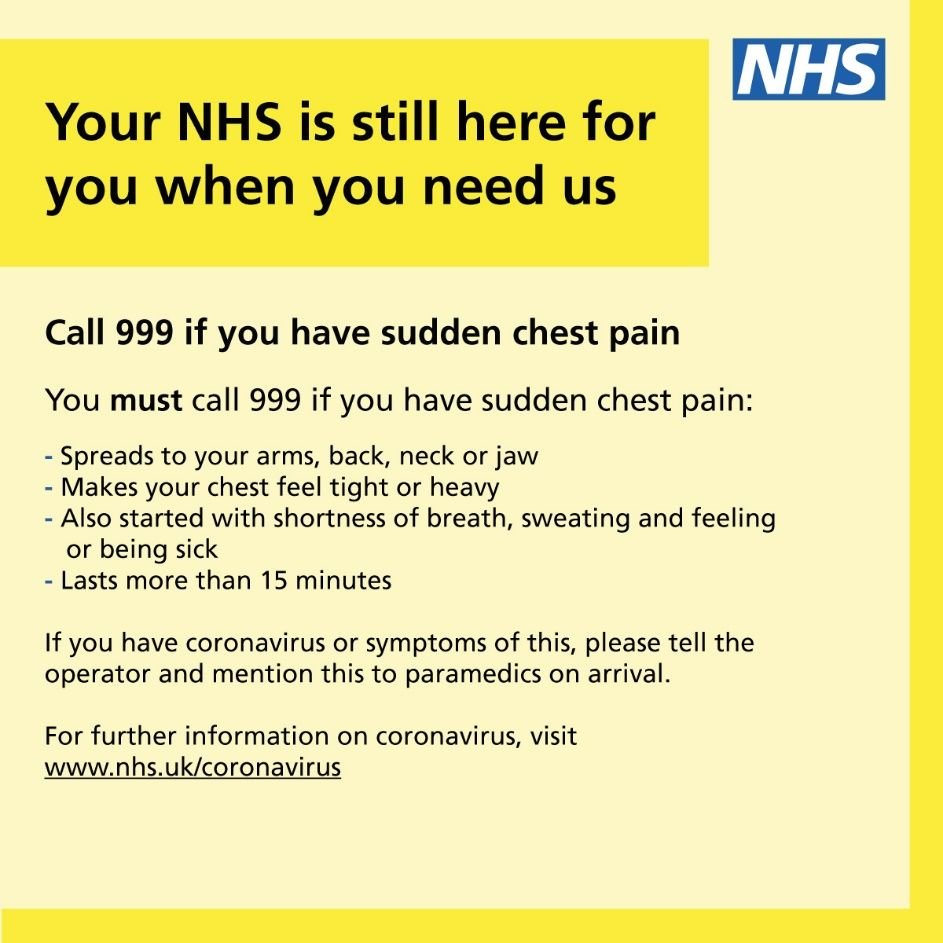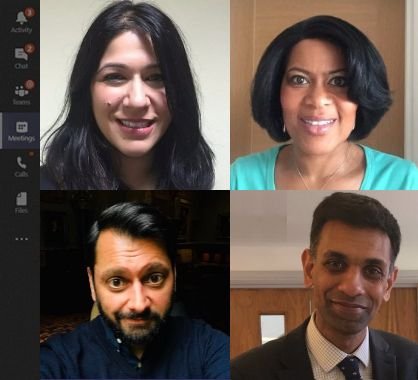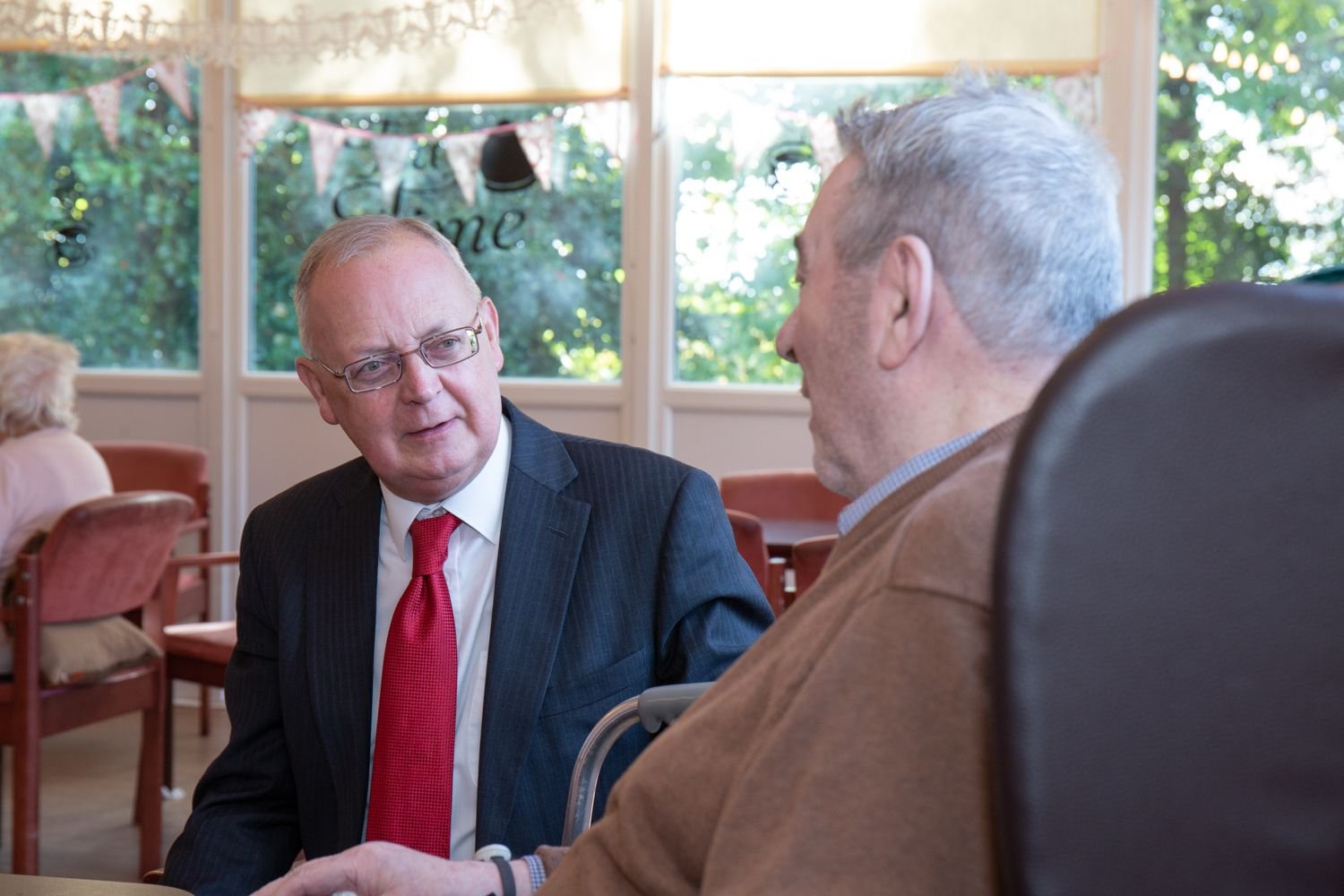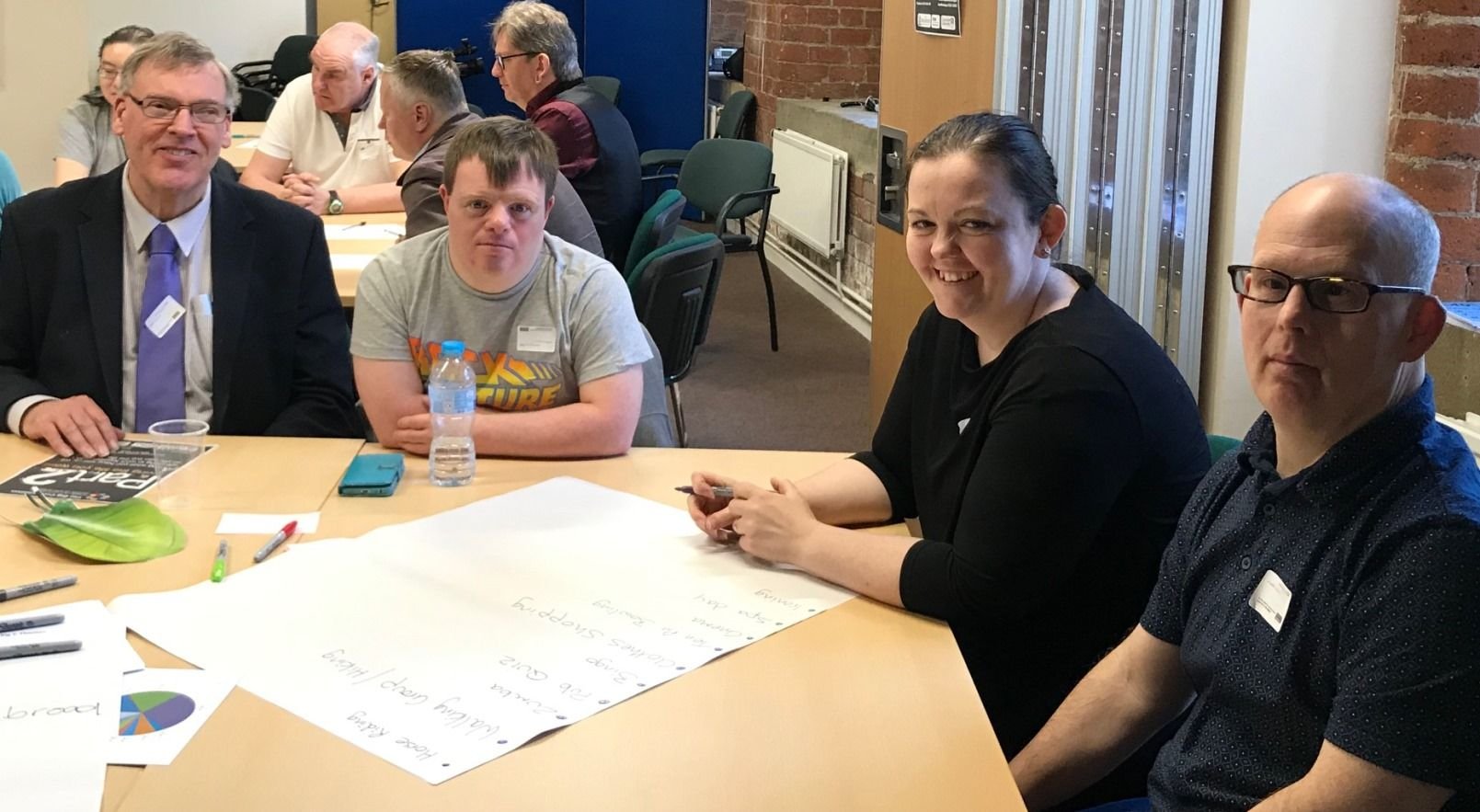Posted on: 7 May 2020
As we head into the second phase of our response to Covid-19, there is a lot to talk about and more to do as a country, a Partnership and in our six local places (Bradford District and Craven; Calderdale, Harrogate, Kirklees, Leeds and Wakefield). Our response to date has been built on the firm foundations of four years of working together for local people and achieved through our colleagues, community sector partners, carers and volunteers. They have been magnificent in what has been the biggest challenge facing humanity for decades.
This second phase is not one of full recovery. It is one of stabilisation and preparing for phase three when we can re-set what we do for a world where we live with this virus. We remain in a “National Level 4 Incident” under a command and control structure with emergency legislation in place. Partner organisations are fully retaining their Emergency Preparedness, Resilience and Response incident co-ordination functions. These have served us well, with good decisions then implemented through partners.
The priorities for this phase were set out last week by NHS England Chief Executive Sir Simon Stevens. In Simon’s letter, it was good to see acknowledgement of integrated care systems like ours. We are essential in planning future NHS activity and some return of urgent treatments, as well as shifting more energy and focus on our care homes and what we can collectively do to support them. The latter is now one of our biggest priorities and the NHS is building on good work already in train to ensure that nursing, infection control and primary care support is available. Our councils are continuing with their work and support, with Public Health England also playing a vital role. Our collective efforts aim to stave off and reduce the impact of this ‘second epidemic’ that could take hold in our care homes if we do not respond appropriately. At the moment, at any one time, up to one in five care homes is impacted. We can, and will make sure this does not increase and, as in hospitals, we reduce the infections and their impact.
We have always been clear that hospitals alone cannot resolve this crisis. They are an essential part of a bigger plan and we are using this phase to ensure that capacity planning for primary, community and social care services is in place. These cannot be overwhelmed by the virus or as our hospitals begin to deliver planned care. That is why caution and stabilisation are key to our success.
As we move forward, the pressure on key workers across all sectors will remain significant. We have put in place local arrangements to support our staff and key workers. This sits alongside national support through a number of routes, including a national staff support line.
Most importantly all colleagues will need active support and compassionate leadership day to day. Our BAME staff, disproportionately impacted need extra support and will receive this, backed by insights from our network of BAME networks and better actions and risk assessments.
 We also continue to strengthen support to communities. We are commissioning a new, central, free helpline to support people who are experiencing grief and loss of life in the difficult circumstances brought about by Covid-19. This is being developed as a first point of contact for anyone and sits alongside local specialist support; and mainstream offers for Improving Access to Psychological Therapies and Child and Adolescent Mental Health Services which have remained available and open throughout this period. Our #StillHereToHelp campaign is promoting these to the public.
We also continue to strengthen support to communities. We are commissioning a new, central, free helpline to support people who are experiencing grief and loss of life in the difficult circumstances brought about by Covid-19. This is being developed as a first point of contact for anyone and sits alongside local specialist support; and mainstream offers for Improving Access to Psychological Therapies and Child and Adolescent Mental Health Services which have remained available and open throughout this period. Our #StillHereToHelp campaign is promoting these to the public.
The direct and indirect health implications of Covid-19 are significant and we need to understand this better. Later diagnosis of health issues will need to consider the wider determinants of healthy lives.
I met this week with a range of public health, NHS, local government and university partners to discuss what we know through research and intelligence. This work is linked closely with our prevention work stream, as part of our Improving Population Health Programme led by Robin Tuddenham, CEO for Calderdale Council and Dr James Thomas, Clinical Chair for Bradford District and Craven Clinical Commissioning Group. We have fantastic insights that will help guide our actions. As a partnership, we exist to improve outcomes for local people – and will focus on those hardest hit. This includes BAME populations, those in poverty, people with mental health and learning disabilities and carers.
Making the most of community insight and innovation in equal measures is essential if we are to move forward at pace, whilst reducing the impact of Covid-19 on all our lives. With this in mind, a number of our Partnership CEOs met on Monday with university leaders to discuss our collective response to the COVID-19 pandemic and reset period. This included discussing opportunities to drive and strengthen partnership working to support shared health and social care priorities in the Leeds City Region and wider. The meeting was chaired by Professor Shirley Congdon, Vice-Chancellor of the University of Bradford and focused on the opportunities for joint working on workforce; economic recovery; research; and innovation. The group will meet again in two weeks and consider specific propositions on each of these four areas.
Amongst these, the retention of positive change and the conditions for positive change must be maintained. For example, physical distancing hasn’t led to social distancing, with neighbourhoods coming together more than ever before; harnessing digital support, innovation and improvement seen in recent weeks; and not going back to old ways of working. To this effectively we need to be honest about the work we have done, what has worked well and what hasn’t. For example the use of digital in our work lives, the role of primary care networks, and the vital input of voluntary, community organisations and charities, who are feeling the pressure of increased demand with limited funding.
As a nation, we are waiting to hear from the Government on what any easing of the lockdown maybe and like many of you, this brings with it mixed feelings for me. Economic sustainability, people’s mental health, children’s education - all balanced against the risk of potentially more lives lost. Until vaccines or treatments become available, a sustainable exit from lockdown requires an advanced strategy to reduce and contain the spread of Covid-19. This must include containment and shielding the most vulnerable, contact tracking and virus tracing.
The Isle of Wight is to be the first place to use the new NHS contact-tracing app which aims to limit a second wave of Covid-19 by tracking down people that coronavirus sufferers have been in prolonged contact with to potentially ask them to self-isolate. The system will be underpinned by an NHS app that alerts people if they have been near someone known to have coronavirus. If the trial goes well, it is anticipated that the app will be rolled out more widely this month across the country.
Richard Gleave, Deputy Chief Executive, Public Health England (PHE), has provided an update on the design work for the public health contact tracing operating model in a letter published on.GOV.UK. In the letter, PHE asks for colleagues from local government to help with public health roles related to the model. An important and logical ask.
The coordination work for our Partnership will be led by Martin Barkley, CEO for Mid Yorkshire Trust Hospitals, with support from Sarah Muckle, Director of Public Health at Bradford Council and Anthony Kealy, Locality Director for West Yorkshire and Harrogate NHS England and NHS Improvement (North East and Yorkshire), to name a few. Kersten England, CEO for Bradford Council is the local authority lead.
It’s clear to me that local authorities must be at the heart of contact tracking and tracing because Covid-19 is best understood as a pattern of local outbreaks in every community. If you read the Local Government Chronicle this week you will have noted the article quoting Sir Chris Ham, chair of Coventry and Warwickshire Sustainability and Transformation Partnership, and Robin Tuddenham, CEO for Calderdale Council and Co-chair of the West Yorkshire Local Resilience Forum that: ‘Councils have an unrivalled understanding of their populations and this must be drawn on if contact tracing and isolating is to be effective. Many people isolating will need skilled support of local authority staff rooted in place’.
As ever, we start with the power of place on people’s lives and must understand the power of place in future phases of our management of this pandemic.
Stay safe and a have good virtual VE day,
Rob
What else has been happening this week?
Let’s start with heartfelt thanks
Colleagues from Calderdale and Huddersfield NHS Foundation Trust want to say a special thank you for the support everyone has given the Trust over the last couple of months. Please watch the video – it is sent with heartfelt thanks.
Calderdale pilot care home scheme
Calderdale Council are running a pilot care home scheme, which was set up in just three weeks and opened last week to support the rising numbers of vulnerable people left in their own homes. Cedar Court Hotel is now registered with the Care Quality Commission as a care home. Staff have been trained in infection control and using personal protective equipment and are working with 28 specialist carers. Robin Tuddenham, CEO for Calderdale Council said: ‘The scale of the challenge of COVID-19 in social care is much bigger than 'in' the NHS, and not many people really understand that yet. The whole principle of the Nightingale hospitals was about surge capacity in the NHS. We need to start thinking about the care sector in the same way. We are in the midst of a second epidemic in social care’. This is one way we are supporting communities and tackling the second epidemic, said Robin.
Virtual roundtable discussion: health and social care – Covid-19 reset planning
A number of our Partnership CEOs met with university leaders on Monday to discuss our collective response to the COVID-19 pandemic and reset period. This included discussing opportunities to drive and strengthen partnership working to support shared health and social care priorities in the Leeds City Region and wider.
The meeting was chaired by Professor Shirley Congdon, Vice-Chancellor of the University of Bradford and focused on the opportunities for joint working on workforce; economic recovery; research; and innovation. The group will meet again in two weeks and consider specific propositions on each of these four areas.
BAME (Black, Asian, Minority and Ethnic) network
 Chairs of BAME networks met virtually on Monday to set out the next steps on how we can support colleagues from BAME backgrounds during the pandemic. Research by the Institute for Fiscal Studies (IFS) has concluded that Britons from black African backgrounds are dying from coronavirus at 3.5 times the rate of white people. A Government review into the issue is currently under way, led by Prof Kevin Fenton, Regional Director for London at Public Health England. Compassionate leadership and support is needed more than ever. A number of proposals went forward to the system leadership executive group meeting on Wednesday, around insight, and leadership representation at the executive level.
Chairs of BAME networks met virtually on Monday to set out the next steps on how we can support colleagues from BAME backgrounds during the pandemic. Research by the Institute for Fiscal Studies (IFS) has concluded that Britons from black African backgrounds are dying from coronavirus at 3.5 times the rate of white people. A Government review into the issue is currently under way, led by Prof Kevin Fenton, Regional Director for London at Public Health England. Compassionate leadership and support is needed more than ever. A number of proposals went forward to the system leadership executive group meeting on Wednesday, around insight, and leadership representation at the executive level.
We are in the process of developing a series of podcasts called ‘Can you hear me?’ developed and facilitated by the West Yorkshire and Harrogate BAME network.
The first episode of the series is being recorded on Thursday 7 May with Yvonne Coghill, Director for Workforce Race Equality Standard (WRES) Implementation at NHS England; Sal Uka, The West Yorkshire Association of Acute Trusts (WYAAT) Clinical Director and Dr Habib Naqvi who is also Policy Lead for the NHS Workforce Race Equality Standard.
We really want to have an honest and supportive conversation addressing some very real concerns and misconceptions that are causing genuine fear in our communities. You can listen to the first episode of 'Can you hear me?' and all of the Partnership's podasts at wyhpartnership.co.uk/news-and-blog/podcasts.
West Yorkshire and Harrogate Clinical Forum
The Clinical Forum met virtually on Tuesday. The meeting was co-chaired by Dr Bryan Gill and Dr James Thomas. Forum members include medical directors, GPs, pharmacists, allied health professionals, lead nurses and NHS England colleagues. The guidance for stroke care regarding atrial fibrillation was agreed and will be shared with the West Yorkshire and Harrogate Stroke Network for implementation.
As we move into other priorities, reflections of our experiences of the Covid-19 pandemic have started to point to the need to understand the learning and innovation that is emerging. There was a discussion about rehabilitation of care as part of shielding people, and also those with musculoskeletal conditions who need treatment and are in pain; and respiratory rehab.
As we restart planned care careful planning, clinical leadership and support will be needed especially in keeping staff safe, well and resilient and with good psychological help. Supporting BAME colleagues and meeting patient demand was highlighted and will be discussed at the Clinical Forum Steering Group next week.
At the Clinical Forum meeting in April, members considered the potential to set out some broad ethical principles that can be applied across the Partnership to further support colleagues to act with confidence and integrity, during the COVID-19 outbreak and beyond. Examples from elsewhere, including the Royal College of GPs, have been used to develop the draft which was discussed. These principles will not replace or duplicate work already in place.
Briefing for West Yorkshire and Harrogate Partnership Board - Our response on COVID-19
 Partnership Board members received an update on Tuesday from Cllr Tim Swift, Chair of the Board and Rob Webster our CEO Lead on the Partnership’s response to COVID-19. This included an overview on how our priorities during the Covid-19 incident will evolve; for example continuing to provide critical and urgent care for COVID-19 patients, their recovery and rehabilitation. Providing essential health and care services during the COVID-19 incident for other groups of people and continuing to support people who are shielded; keeping health and care colleagues safe and well and understanding the wider impact on different groups of people including those with mental health concerns. There was also an update on co-ordinating our reset to the new ‘normal’, including responding to future COVID-19 peaks. Tackling health inequalities; virus testing; contact tracking and tracing and the economy were also discussed.
Partnership Board members received an update on Tuesday from Cllr Tim Swift, Chair of the Board and Rob Webster our CEO Lead on the Partnership’s response to COVID-19. This included an overview on how our priorities during the Covid-19 incident will evolve; for example continuing to provide critical and urgent care for COVID-19 patients, their recovery and rehabilitation. Providing essential health and care services during the COVID-19 incident for other groups of people and continuing to support people who are shielded; keeping health and care colleagues safe and well and understanding the wider impact on different groups of people including those with mental health concerns. There was also an update on co-ordinating our reset to the new ‘normal’, including responding to future COVID-19 peaks. Tackling health inequalities; virus testing; contact tracking and tracing and the economy were also discussed.
West Yorkshire and Harrogate System Leadership Executive Group Meeting
The Executive Group met on Tuesday. This involves leaders from all partner sectors, including councils, hospitals, clinical commissioning groups, Healthwatch and community organisations. It is chaired by Rob Webster, our Partnership CEO Lead.
As we move past the immediate response to the pandemic, we need to consider how we work together in this new phase of the response and address the priorities which have been communicated to us in the past week, including from NHS England.
The repercussions of Covid-19 are far wider than the immediate health and care implications of health conditions alone. Measures to control the spread of the virus are likely to have significant longer term implications on health inequalities.
If ever there was a time to put ‘care’ into the Partnership it is now. There are more people employed in independent sector than that of public services. It’s also about home care support, respite care and support for carers, young people’s care and the workforce. A longer term strategy - for both care homes and home care is needed and it was agreed that this would be discussed as part of the Primary and Community Care Programme.
Understanding the impacts of COVID-19 on population health
A virtual meeting took place on Wednesday with leading public health specialists and data analysts from across the area. Chaired by Rob Webster, CEO Lead for the Partnership, colleagues discussed how we can build an understanding the impact of the COVID-19 pandemic on people living in West Yorkshire and Harrogate. Over the past month the health and care system has responded to the immediate threat of COVID-19, through expanding critical care capacity, supporting people leaving in hospital and helping those who are shielded from the virus. We are however mindful of the fact that there is much about the impact of the virus that we do not understand, including both the direct impact across different population groups and places, and the indirect impacts of the restrictions that have been put in place to limit the spread. Our Partnership has a strong focus on tackling inequalities. There is a strong commitment to build on this and develop a better understanding of these wider impacts, to inform priorities as we move into phase two of the Covid-19 response. There is an aim to scale up some of the excellent work already underway, for example the Born in Bradford survey and we look forward to seeing this important report once published.
Children, Young People and Families Programme
 The programme has funded the Digibete App for all children and young people with type 1 diabetes across West Yorkshire and Harrogate. This is a Diabetes Clinic Communications, Education and Patient Self-Management App.
The programme has funded the Digibete App for all children and young people with type 1 diabetes across West Yorkshire and Harrogate. This is a Diabetes Clinic Communications, Education and Patient Self-Management App.
Despite huge improvements from clinical teams, approximately 70% of young people still struggle to manage their diabetes safely. It is widely recognised that the vast majority of self-management happens in the community and therefore clinically approved education resources need to be available when needed. It includes a Diabetes Clinic Communications, Education and Patient Self-Management App.
All the information on Digibete has been co-designed with people with diabetes and families. It includes information on sports and exercise; insulin pumps and technology; emotional wellbeing, school and education. There are also resources specific to teenagers, healthy eating and carbohydrate counting and guidance on diabetes management. All of our six diabetes units are signed up to this and will be implementing the App.
Health and Care Champions – people with learning disabilities
 The West Yorkshire and Harrogate Learning Disabilities Champions project has been re-framed to reflect the needs of our programmes and partners during the coronavirus outbreak. We are working with BTM on a review of the assets they have in hand that are aligned to our programmes, priorities and specific to Covid-19 with the aim of packaging those for sharing with our network.
The West Yorkshire and Harrogate Learning Disabilities Champions project has been re-framed to reflect the needs of our programmes and partners during the coronavirus outbreak. We are working with BTM on a review of the assets they have in hand that are aligned to our programmes, priorities and specific to Covid-19 with the aim of packaging those for sharing with our network.
Harnessing the Power of Communities Programme
The Harnessing the Power of Communities Programme has been working with other programme leads to ensure the voluntary and community sector (VCS) are linked in and where appropriate there is collaboration in the COVID-19 response planning and delivery. The VCS continues to be active across West Yorkshire and Harrogate – examples include distributing books and activity packs to isolated and vulnerable people, gardening at care homes, remote exercise classes, and online activities ran for people with learning disabilities. They continue to support many people isolated or shielded at home through food and medicine delivery, helplines and phone support.
We are considering models for longer term investment to ensure sustainability of support and that their contribution to reducing health inequalities is recognised across all sectors. Local VCS co-ordinating organisations, have initiated a resilience survey to understand the impact of COVID-19 on the sector across the area. The results of this are currently being collated and will be analysed at a local and West Yorkshire and Harrogate level. As with other programmes, colleagues are moving into planning phase-two of our COVID-19 response. We are anticipating increased demand on community services and support delivered by the VCS. Working to identify and put in place funding, training, health and wellbeing support, digital infrastructure and so on to increase reach, efficiency and meet emerging need is essential for the sector.

